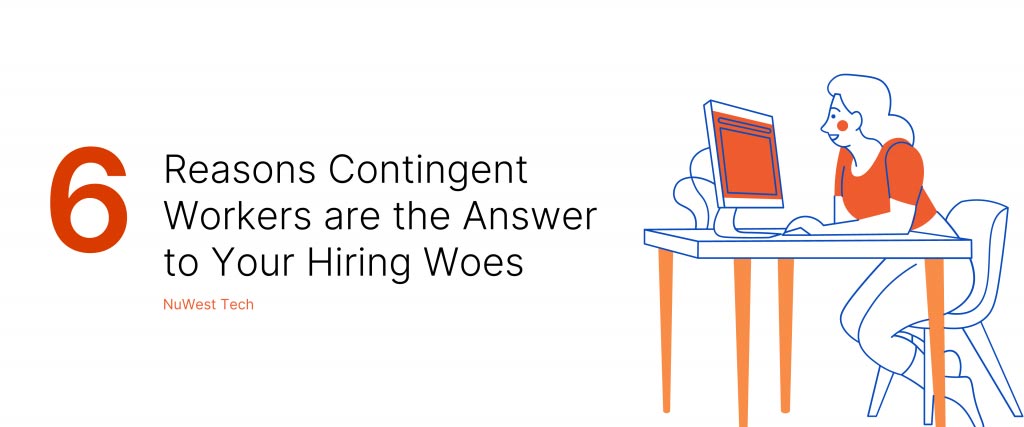Six Reasons Contingent Workers are the Answer to Your Hiring Woes
Direct hire openings have grown exponentially in recent months and have been notoriously hard to fill. Positions are staying open weeks to months longer than average and it requires more manpower than ever before to source talent and hire. The remedy? Contingent workers.
By 2050, contingent workers are expected to make up 50% of the workforce with large companies increasing use of a flexible workforce by 80% in coming years, according to Forbes.
Flexible workforces are becoming a major piece of the pie when it comes to business plans, and if you aren’t already utilizing them now is a great time to start.
These are the top reasons hiring managers are investing big in contract and contingent workers (and how they can help you shake the Great Resignation hiring blues):
#1 | PREVENT BURNOUT BY REDISTRIBUTING WORKLOAD
The Great Resignation has seen workers leaving understaffed teams to escape burnout and secure higher pay and better work-life balance. At the same time, it’s getting more and more difficult to hire talent and retain your best employees with historic talent shortages and rising wages creating new obstacles.
A CNBC survey found that “exactly half of U.S. workers describe their companies as being understaffed, and these workers are more likely to say they have recently considered quitting.” It’s no secret that burnout and a heavy workload greatly increase the risk of employee resignation.
Bringing on a contingent worker to fill a gap on your team allows you to carve out tasks your team is struggling with and reassign those to a fresh employee. Then, your team can take time to reprioritize and focus on the work that they enjoy most.
#2 | TIME AND CLARITY TO REALLY FILL A NEED EFFECTIVELY
Maybe your team is growing, or your project has had a few scope changes and it’s become obvious that there are gaps on the team and it’s time to hire. What do you do? You could quickly write up a JD, send HR on a search to fill your role, and spend weeks to months interviewing candidates only to have the needs of the team change by the time a candidate finally accepts an offer, or you could leverage a short-term contractor to get things back on track and create some breathing room.
When things are in rapid growth and changing constantly, you may not yet know what skills and expertise your team truly needs until months down the road. Committing to a permanent hire prematurely can be costly and detrimental to project timelines and team success. Contract hires allow you to pivot to meet your team’s need quickly and without the additional baggage that comes with relocating a permanent hire.
#3 | HIRE QUICKLY AND AVOID RED TAPE
You and I know very well how tough it is to find and close a direct-hire employee that can help your team with backlog, especially in a short timeframe. Between getting budget approval and completing your organization’s end-to-end hiring process weeks and months can be eaten away before a new employee can get to work. If your team is on the edge of burnout and struggling to meet deadlines, a two to three month long hiring process won’t cut it.
Since contingent workers are not full-time employees of your organization, many barriers in the hiring process are removed. A contractor doesn’t come with the same costs and legal obligations as a full-time hire, so it’s generally an easier and shorter process to get budget approval and get on offer out to a candidate. The process is even faster when candidates are referred from a staffing agency—these candidates have already been screened and reviewed before they even reach the first interview with a hiring manager.
#4 |TEST DRIVE EMPLOYEES BEFORE INVESTING LONG-TERM
Contract work is the try before you buy of the hiring world. Utilizing contractors allows you to find great people for your team without fully investing right away. This flexibility allows you to ensure that a new employee meshes well with your team and is committed before investing in them as a full-time hire.
According to the US Department of Labor, a bad hire will cost a company at least 30% of their first-year earnings. Time spent onboarding and training the new hire, a hit to productivity and team morale, and possible legal action depending on the details of termination are burdens that fall on the company after hiring the wrong person for the job.
#5 | BRING IN SPECIALIZED EXPERTISE FOR A FIXED PERIOD
Having skills gaps on your team will slow progress and sometimes block it completely. In a perfect world, you would have an expert in every subject area on your team, but there are very few orgs with the budget or headcount to do that. I always recommend bringing in contingent workers to fill gaps on complex projects or projects that have a specific goal with no continuing need.
Recently, a client began implementing a new company wide project management tool, but certain steps in the implementation required expertise the client’s current team didn’t have. The client could have invested time and money in training current employees in this skill even though the team would not need this skill in the future. Instead, they brought on a contractor specialized in large scale implementation of that specific project management tool for a 6-month term. The result was the implementation being completed on time and within budget and the permanent team being able to focus on other areas of the implementation. Once the project was wrapped, the client’s team got back to work in their areas of expertise and the specialist moved on to their next assignment.
#6 | KEEP COSTS LOWER WHILE WAITING FOR BUDGET APPROVAL
The hourly rate for a contractor at may seem to be more expensive than the rate you would offer a full-time employee, but the overall cost to hire a contractor is lower almost every time.
According to BusinessWeek, contractors cost up to 30% less than full-time hires. A full-time hire will cost an employer 20 to 40% above their salary due to payroll taxes, unemployment insurance, worker’s comp and disability, and other benefits like paid time off and professional development.
Don’t worry, even though your org may not provide contract employees with insurance or retirement benefits, we’ve got them covered. We offer comprehensive medical coverage, access to mental health support, and 401k plans to contractors we place.
Our specialized recruiting teams are constantly connecting with top contract talent in technology, engineering, Information Technology, and Business Ops. Whether you’re just starting to add contingent workers to your team or are looking to supplement your existing flexible workforce, we have pre-vetted talent ready to get to work.
HIRE GREAT TALENT
ABOUT LIZ WEBER
Liz is the Director of Strategic Accounts at NuWest Group. She has over 25 years of experience in the staffing industry and helps companies achieve business growth by uncovering staffing inefficiencies. Liz specializes in engineering and technology staffing and has dominated in Seattle’s tough tech market. When she isn’t leading recruiting teams in Technology, Engineering, Business Operations, and Manufacturing you can find her sharing her knowledge with aspiring sales professionals at the University Washington.


